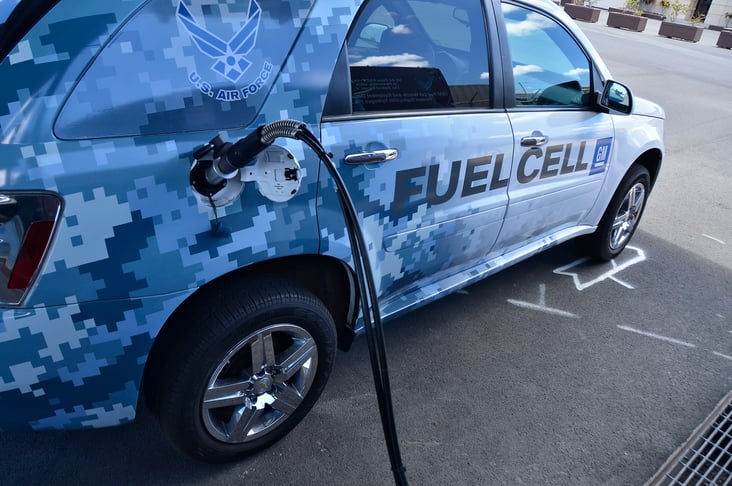This post is one in a series featuring the complete slate of advanced energy technologies outlined in the report This Is Advanced Energy.

Hydrogen vehicles are either fuel cell vehicles (FCVs) or internal combustion engine (ICE) vehicles designed to burn hydrogen instead of gasoline. FCVs are actually electric vehicles in which the electricity is produced on board by fuel cells — electrochemical devices that convert hydrogen and oxygen (in the air) directly into electricity without combustion. Pure hydrogen gas is stored onboard the vehicle in pressurized tanks or other means. FCVs can be refilled within 10 minutes at a hydrogen fueling station. FCVs have a range of approximately 300 miles, similar to conventional ICE vehicles, and produce only water as a byproduct. There has also been some development of hydrogen-fueled ICE vehicles, which offer high fuel efficiency and very low tailpipe emissions.
Major auto manufacturers including Toyota, Mercedes-Benz, Hyundai, Honda, and General Motors have developed passenger FCVs for pilot deployment. In addition, there are several medium- and heavy-duty hydrogen FCVs available on the market, including transit buses and tractors. However, before FCVs or hydrogen ICE vehicles can reach widespread commercial use, fueling infrastructure must be developed. As of publication of the report, there are 48 public and private hydrogen fueling stations spread across 17 states, with public stations in California, South Carolina, and Connecticut. While FCVs have not reached widespread deployment for passenger vehicle applications, the technology is road-ready, with some of GM’s test fleet vehicles exceeding 120,000 miles and enduring winter conditions.
FCVs offer some advantages over plug-in electric vehicles (PEVs); namely, their longer driving range and short refueling time. Like PEVs, hydrogen-fueled vehicles provide consumers with alternatives to petroleum, and if deployed widely FCVs would enhance fuel diversity and energy security. Hydrogen FCVs are more expensive than gasoline-powered vehicles but are rapidly becoming more competitive, with fuel cell system costs for FCVs dropping 56% from 2006 to 2012. Companies including Walmart, Sysco, Coca-Cola, and Kroger are already investing in fuel cell technology for their operational needs, using hydrogen to power forklifts, which has emerged as a cost-effective early application. Sysco has over 600 hydrogen fuel cell forklifts in its Texas, Virginia, and Pennsylvania facilities, reducing maintenance costs on its forklift fleet. In the first year, 100 fuel cell forklifts also saved the company $100,000 in labor costs due to short refueling times compared with the former fleet of battery-operated forklifts.
Learn more about advanced vehicles and all the other advanced energy technologies in our report, This Is Advanced Energy, available for free at the link below.
